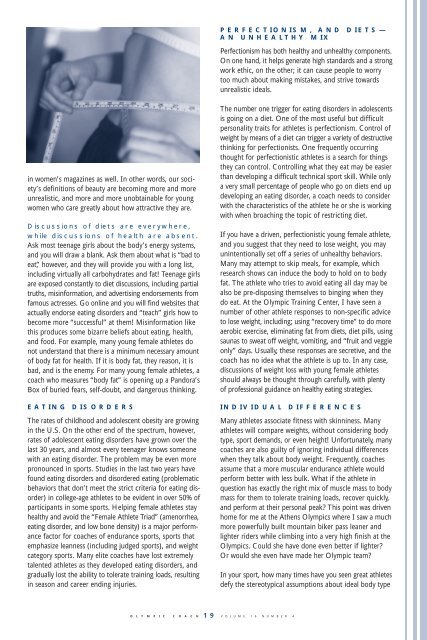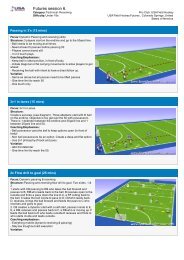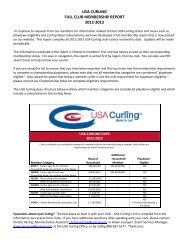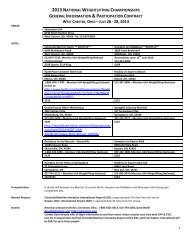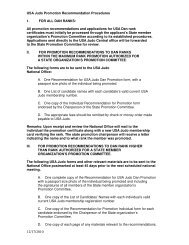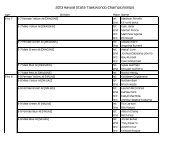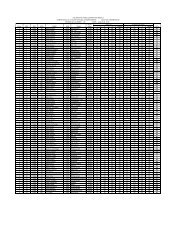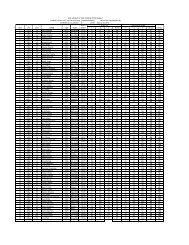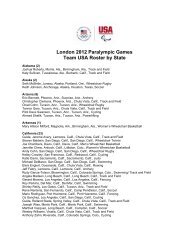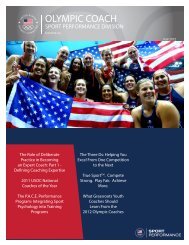OLYMPIC COACH - United States Olympic Committee
OLYMPIC COACH - United States Olympic Committee
OLYMPIC COACH - United States Olympic Committee
You also want an ePaper? Increase the reach of your titles
YUMPU automatically turns print PDFs into web optimized ePapers that Google loves.
in women’s magazines as well. In other words, our society’s<br />
definitions of beauty are becoming more and more<br />
unrealistic, and more and more unobtainable for young<br />
women who care greatly about how attractive they are.<br />
Discussions of diets are everywhere,<br />
while discussions of health are absent.<br />
Ask most teenage girls about the body’s energy systems,<br />
and you will draw a blank. Ask them about what is “bad to<br />
eat,” however, and they will provide you with a long list,<br />
including virtually all carbohydrates and fat! Teenage girls<br />
are exposed constantly to diet discussions, including partial<br />
truths, misinformation, and advertising endorsements from<br />
famous actresses. Go online and you will find websites that<br />
actually endorse eating disorders and “teach” girls how to<br />
become more “successful” at them! Misinformation like<br />
this produces some bizarre beliefs about eating, health,<br />
and food. For example, many young female athletes do<br />
not understand that there is a minimum necessary amount<br />
of body fat for health. If it is body fat, they reason, it is<br />
bad, and is the enemy. For many young female athletes, a<br />
coach who measures “body fat” is opening up a Pandora’s<br />
Box of buried fears, self-doubt, and dangerous thinking.<br />
EATING DISORDERS<br />
The rates of childhood and adolescent obesity are growing<br />
in the U.S. On the other end of the spectrum, however,<br />
rates of adolescent eating disorders have grown over the<br />
last 30 years, and almost every teenager knows someone<br />
with an eating disorder. The problem may be even more<br />
pronounced in sports. Studies in the last two years have<br />
found eating disorders and disordered eating (problematic<br />
behaviors that don’t meet the strict criteria for eating disorder)<br />
in college-age athletes to be evident in over 50% of<br />
participants in some sports. Helping female athletes stay<br />
healthy and avoid the “Female Athlete Triad” (amenorrhea,<br />
eating disorder, and low bone density) is a major performance<br />
factor for coaches of endurance sports, sports that<br />
emphasize leanness (including judged sports), and weight<br />
category sports. Many elite coaches have lost extremely<br />
talented athletes as they developed eating disorders, and<br />
gradually lost the ability to tolerate training loads, resulting<br />
in season and career ending injuries.<br />
O L Y M P I C C O A C H 19 VOLUME 16 NUMBER 4<br />
PERFECTIONISM, AND DIETS—<br />
AN UNHEALTHY MIX<br />
Perfectionism has both healthy and unhealthy components.<br />
On one hand, it helps generate high standards and a strong<br />
work ethic, on the other; it can cause people to worry<br />
too much about making mistakes, and strive towards<br />
unrealistic ideals.<br />
The number one trigger for eating disorders in adolescents<br />
is going on a diet. One of the most useful but difficult<br />
personality traits for athletes is perfectionism. Control of<br />
weight by means of a diet can trigger a variety of destructive<br />
thinking for perfectionists. One frequently occurring<br />
thought for perfectionistic athletes is a search for things<br />
they can control. Controlling what they eat may be easier<br />
than developing a difficult technical sport skill. While only<br />
a very small percentage of people who go on diets end up<br />
developing an eating disorder, a coach needs to consider<br />
with the characteristics of the athlete he or she is working<br />
with when broaching the topic of restricting diet.<br />
If you have a driven, perfectionistic young female athlete,<br />
and you suggest that they need to lose weight, you may<br />
unintentionally set off a series of unhealthy behaviors.<br />
Many may attempt to skip meals, for example, which<br />
research shows can induce the body to hold on to body<br />
fat. The athlete who tries to avoid eating all day may be<br />
also be pre-disposing themselves to binging when they<br />
do eat. At the <strong>Olympic</strong> Training Center, I have seen a<br />
number of other athlete responses to non-specific advice<br />
to lose weight, including; using “recovery time” to do more<br />
aerobic exercise, eliminating fat from diets, diet pills, using<br />
saunas to sweat off weight, vomiting, and “fruit and veggie<br />
only” days. Usually, these responses are secretive, and the<br />
coach has no idea what the athlete is up to. In any case,<br />
discussions of weight loss with young female athletes<br />
should always be thought through carefully, with plenty<br />
of professional guidance on healthy eating strategies.<br />
INDIVIDUAL DIFFERENCES<br />
Many athletes associate fitness with skinniness. Many<br />
athletes will compare weights, without considering body<br />
type, sport demands, or even height! Unfortunately, many<br />
coaches are also guilty of ignoring individual differences<br />
when they talk about body weight. Frequently, coaches<br />
assume that a more muscular endurance athlete would<br />
perform better with less bulk. What if the athlete in<br />
question has exactly the right mix of muscle mass to body<br />
mass for them to tolerate training loads, recover quickly,<br />
and perform at their personal peak? This point was driven<br />
home for me at the Athens <strong>Olympic</strong>s where I saw a much<br />
more powerfully built mountain biker pass leaner and<br />
lighter riders while climbing into a very high finish at the<br />
<strong>Olympic</strong>s. Could she have done even better if lighter?<br />
Or would she even have made her <strong>Olympic</strong> team?<br />
In your sport, how many times have you seen great athletes<br />
defy the stereotypical assumptions about ideal body type


